The period of 1953-1967 was a time of seminal change and advancement, during which the McGill Faculty of Law achieved many firsts for Quebec and for Canada. F.R. Scott led the first successful lawsuit against a sitting head of government at the Supreme Court of Canada; Marie-Claire Kirkland became the first woman elected to the National Assembly; Frederick Phillips became the first Black lawyer in Quebec; Maxwell Cohen was named the first Jewish Dean of a Quebec law faculty; McGill founded the Institute of Comparative Law; and New Chancellor Day Hall became the first purpose-built law building at McGill. Altogether, this was a critical span of time in which McGill Law cemented itself as a fixture in Quebec and Canadian society. From this point onward, the Faculty would continue to establish its identity as a place where limits are questioned and barriers are broken.
In this period:
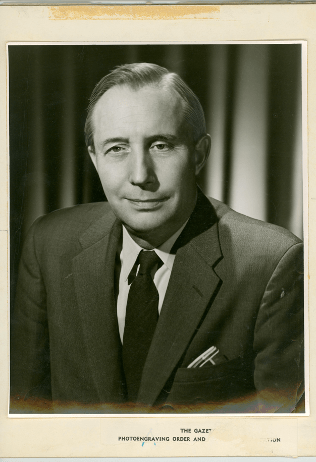
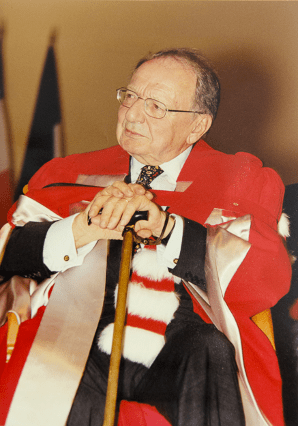
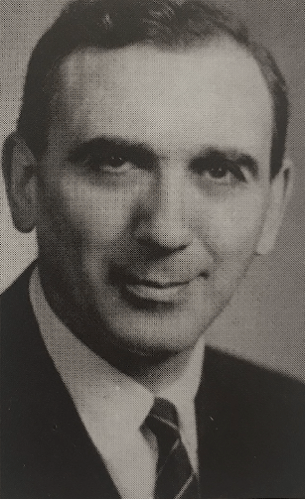
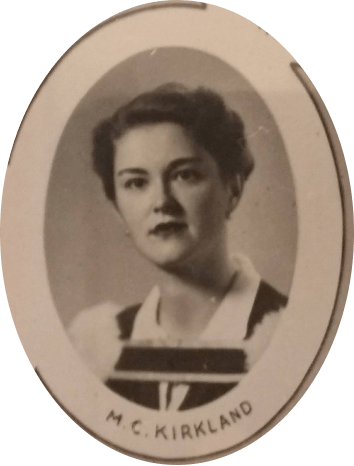
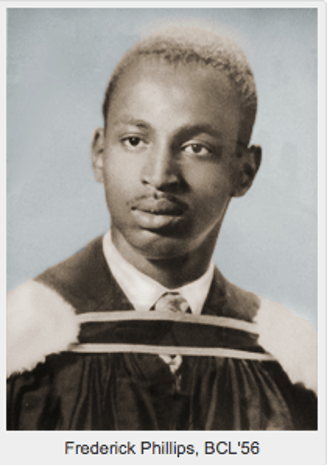
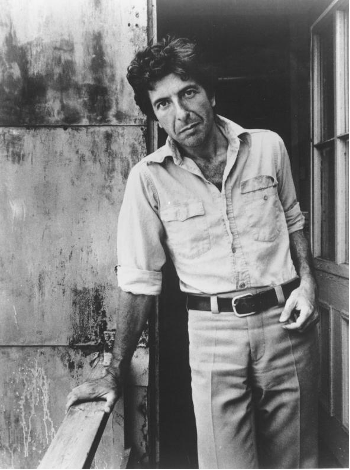
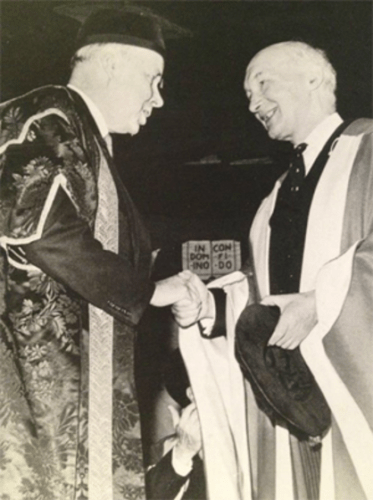
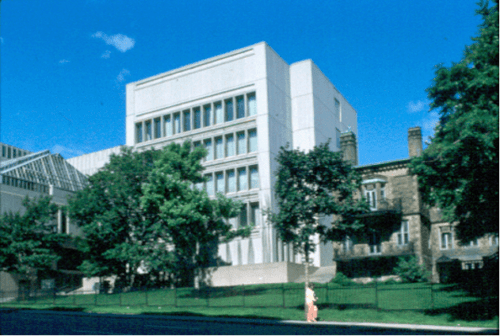

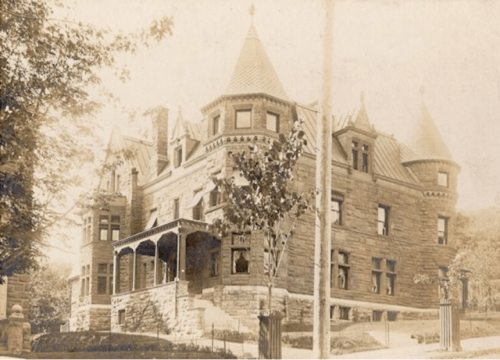
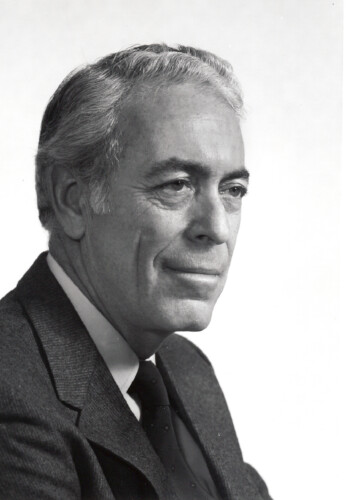
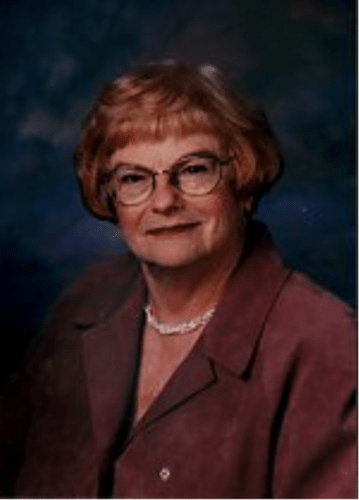
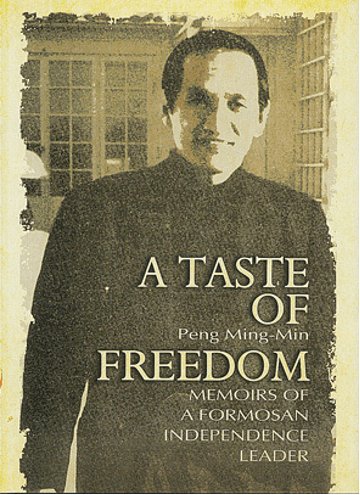
F.R. Scott

Francis Reginald (Frank) Scott (B.C.L. 1927) joined the Faculty in 1928 on his former professor H.A. Smith’s recommendation. Scott was a renowned poet and founded the Fortnightly Review with A.J.M. Smith as students at McGill. Scott’s Collected Poems (1981) won the Governor General’s Award for Poetry and his Poems of French Canada (1977) won the Canada Council’s translation prize. Scott was also involved with left-wing political causes throughout his career as an architect of Canadian socialism, including as an early leader of what became the New Democratic Party. Beyond poetry and socialist causes, he also founded the Canadian Association of Law Teachers in 1951, served as a United Nations Representative to Burma in 1952, co-founded Recherches sociales (a study group that examined English-French relations in Canada), and was a member of the Royal Commission on Bilingualism and Biculturalism. Scott’s constitutional advocacy included watershed civil liberties cases, most notably Roncarelli v Duplessis, Switzman v Elbling, and Brodie v The Queen.
Due principally to his political views, he was only appointed Dean in 1961 (he served until 1963), after decades as a beloved but provocative teacher. The F.R. Scott Chair in Public and Constitutional Law at the Faculty was established in his honour in 1997.
Professor Paul-André Crépeau

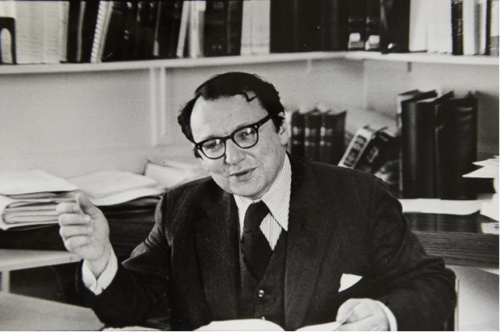
Paul-André Crépeau was a professor at the McGill Faculty of Law for over fifty years and left a far-reaching mark on the Faculty and the civil law of Quebec. He dedicated his life to the advancement of learning in private law, authoring over 130 academic works. From 1965 to 1977, Crépeau was President of the Revision Office for the Civil Code of Quebec, whose research, consultations, and expertise led to the new Civil Code of Quebec in 1994. The Code had not been updated since McGill Chancellor Dewey Day led the codification of the 1867 Civil Code of Lower Canada. Paul-André Crépeau has been said to have become the very embodiment of Quebec civil law on the international stage.
Beyond leading the team that redrafted the new Civil Code, Crépeau’s work, along with colleague Frank R. Scott, contributed to the National Assembly’s inspiration to formulate the Charter of Human Rights and Freedoms of 1975. That year, Crépeau founded the Quebec Research Centre of Private and Comparative Law; he was its director until 1996. The Centre was renamed the Paul-André Crépeau Centre for Private and Comparative Law in 2012. Crépeau was also one of the pioneers of jurilinguistics in Canada. Cited as a “veritable amoureux de la langue française,” Crépeau was awarded the Prix Georges-Émile-Lapalme for his exceptional contribution to the quality and promotion of the French language in Quebec.
Dean Maxwell Cohen

Maxwell Cohen began teaching at McGill in 1946 after serving as a major in the Canadian Army during World War II. Cohen replaced John Peters Humphrey upon his retirement from McGill, making Cohen the first full-time Jewish professor at the McGill Faculty of Law. Cohen went on to serve as Dean of Law from 1964 to 1969. Cohen’s foremost contribution to McGill Law was establishing, in 1968, the National Programme, which trained students concurrently in both the civil law and common law traditions. During Cohen’s tenure, McGill Law also inaugurated New Chancellor Day Hall.
Cohen’s influence reached well beyond McGill’s Faculty of Law. He served as Chairman of the Minister of Justice’s Special Committee on Hate Propaganda from 1965 to 1966 and authored key provisions that were incorporated into the Criminal Code of Canada. Cohen represented Canada at the United Nations, heavily influenced the drafting of the Canadian Charter of Rights and Freedoms, and was a constitutional advisor to the New Brunswick government. He was made an Officer of the Order of Canada in 1976 and from 1981 to 1985 served as Canadian judge ad hoc for the International Court of Justice. Along with the Maxwell Cohen Award for achievement in international law, the Maxwell Cohen Moot Court in New Chancellor Day Hall honours his legacy.
Marie-Claire Kirkland

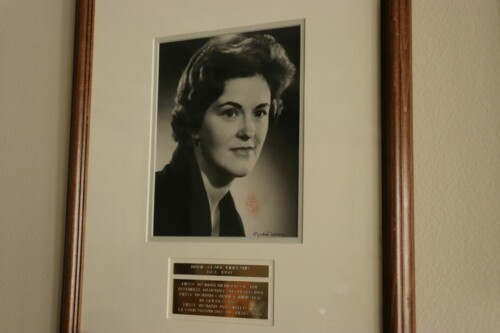
Marie-Claire Kirkland (B.C.L. 1950, LL.D. 1997) was the first woman to hold office in the Legislative Assembly of Quebec, a body to which she was elected in 1961. She was also the first woman to plead before the Quebec Private Bills Committee and to serve as Cabinet Minister in Quebec. She later became Quebec’s first female judge. She was named to the Order of Canada in 1992 and, in 1993, she received the Governor General’s medal for her work in women’s rights alongside Elizabeth Monk.
Kirkland graduated less than a decade after women received suffrage and were admitted to the Quebec Bar. Over the course of her career, she succeeded in changing many aspects of the law as it relates women. For instance, she passed bills to protect married women’s property and to allow married women to enter into contracts without their husbands’ consent. She also worked as Minister of Transportation and Communications, a position she lobbied for partly to defy the expectation that, as a woman, she would want to be Minister of Social Welfare. She later became Minister of Tourism, Game and Fishing, where she promoted Quebec tourism, helped create the first wildlife preserves in Quebec, and passed the Cultural Property Act.
Frederick R. Phillips: First Black Lawyer Admitted to Quebec Bar

Frederick R. Phillips (B.C.L. 1956) was the first Black lawyer to be admitted to the Quebec Bar. Although he was not the first Black student at McGill Law, he was the first to practice law in the Province. As a veteran returning from three years in the Air Force, he completed his entire high school diploma in one year, then pursued a B.A. and finally a B.C.L. at McGill. Phillips was called to the Quebec Bar a full century later than the first Black lawyer was called to the Bar in Ontario. He practiced law for 36 years and was a trailblazer for generations of Black lawyers who followed and continued to face barriers in the legal profession.
Leonard Cohen’s Brief Stint at McGill Law

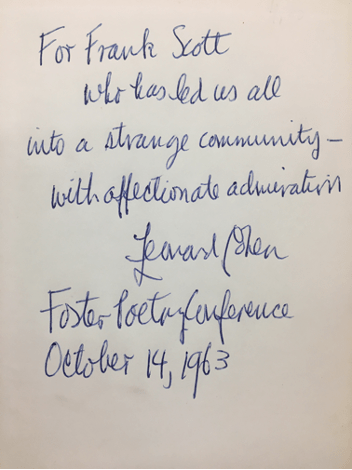
Singer-songwriter and poet Leonard Cohen (LL.D. 1992) (above left) spent one brief semester at the Law Faculty after completing his Bachelor of Arts at McGill. He studied under F.R. Scott, who became an important mentor beyond his time at McGill. Scott lent Cohen a cabin in North Hatley, where Cohen worked on his first novel The Favourite Game. Cohen later said that Scott gave him the “courage to fail” when, as a young writer, he was nervous about leaving the family clothing business. Above (right) is the inscription from Scott’s copy of Cohen’s Beautiful Losers.
Lord Denning’s Visit to McGill Law
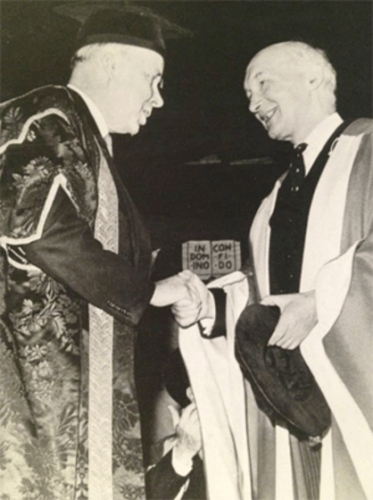
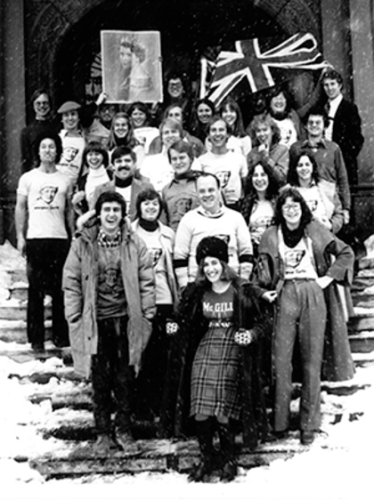
Lord Alfred Thompson Denning (LL.D. 1967) was an icon of the British common law. He visited the Faculty in 1967 to attend the inauguration of New Chancellor Day Hall and to receive an honorary doctorate (shown above, left) from McGill Law. McGill Law students have long adored Lord Denning. In 1978, the students pictured above (right) obtained Lord Denning’s permission to print his image onto shirts and to sell them at the Faculty. The students later took a picture (above, right) on Old Chancellor Day Hall’s front steps wearing the shirts, waving the British flag, and displaying a portrait of Queen Elizabeth. The students sent the picture to Lord Denning, who answered via a hand-written note. He thanked them for the photo, adding “I am thrilled to have it: and it will find an honoured place in my library – reminding me always of the very best group of the very best students of the very best University in North America or anywhere in the wide world.” Denning finished his note by inviting the students to visit him if they ever were in England and wishing them good luck with their studies. One of the students in the photo, Jacqueline Johnson Clifford (B.C.L. 1980), visited his office that summer. Surely enough, the framed photo of the McGill Law students was displayed on the wall of the library in Lord Denning’s chambers.
New Chancellor Day Hall

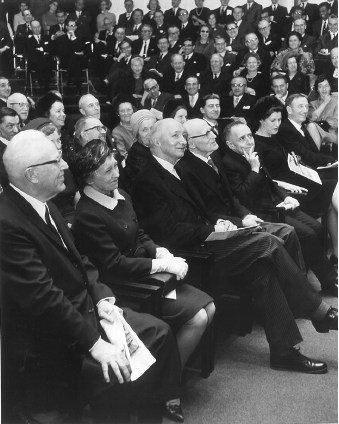
New Chancellor Day Hall, the new McGill Law building, was completed in 1967. Located in the heart of downtown Montreal and adjacent to OCDH, NCDH cost $1.825 million to build, which was provided by the Law Faculty’s generous supporters. The new building’s six floors provided seven additional classrooms as well as space for a moot court, common areas, lockers and the law library, which occupied four floors. The law library could accommodate 200 students as well as 100,000 volumes.
On the right, the audience at the inauguration of New Chancellor Day Hall on January 21, 1967 is pictured. A testament to McGill Law’s reputation, the event was attended by some of the most celebrated jurists in the world. During the bilingual opening ceremony, McGill Law awarded seven honorary doctorates to the attendees, including Chief Justice Robert Taschereau of the Supreme Court of Canada, Chief Justice Earl Warren of the United States Supreme Court (pictured at the bottom left corner of the photo above), Master of the Rolls of Great Britain’s Court of Appeal Lord Denning (pictured in the center of the photo above), Supreme Court of Canada Justice Ivan C. Rand, Associate Chief Justice of the Superior Court of Quebec G.S. Challies, Dean of Université de Montréal’s Faculty of Law Maximilien Caron, and French law professor Jean Carbonnier of the Université de Paris.
Douglas Charles Abbott

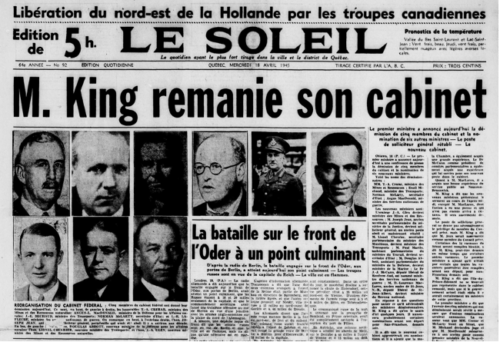
Douglas Charles Abbott (B.C.L. 1921, LL.D. 1951) was an accomplished lawyer, lecturer, politician, and judge. Abbott also served overseas in World War I, interrupting his studies at McGill Law for two years. He completed his law degree after the war, graduating as a member of the Famous Class of Law ’21 at McGill, along with Brooke Claxton (B.C.L. 1921, LL.D. 1950).
From 1931 to 1939, Abbott gave civil procedure lectures at McGill’s Faculty of Law. In 1940, he was elected to the House of Commons as a Liberal, a seat he held for 14 years. In 1945, Abbott was appointed Minister of National Defence as World War II came to a close (see the bottom left corner of the newspaper above). The following year, Abbott became Minister of Finance and was then directly elevated to the Supreme Court of Canada in 1954. This judicial appointment directly from Cabinet was very controversial; a Cabinet Minister has not been appointed directly to the Supreme Court since Abbott.
The Institute of Comparative Law is Founded

The Institute of Comparative Law was founded in 1965 under the leadership of Dean Maxwell Cohen and funded by a Ford Foundation Grant. Since its creation, the Institute has been dedicated to promoting research in private, public, and international comparative law. The Institute, originally named the Institute of Foreign and Comparative Law, was a forerunner of the LL.B. programme created in 1968. Its mandate encouraged the hiring of common law professors and, with the impetus the Institute provided, the Faculty offered common law courses to graduate and undergraduate students for the first time in decades. The Institute’s focus on international and comparative law allowed the Faculty to move away from an “insular and monojural” curriculum based on professional training, to the bijural and academic model for which McGill Law is known today.
The Institute, along with the Institute of Air and Space Law, has attracted many international students and scholars from around the world to McGill for graduate work. Over the years, it has participated in many global projects, including law reform projects in countries such as Vietnam, China, and Russia.
Manuel Shacter

Manuel Shacter (B.C.L. 1947) is a successful litigator perhaps best known for his work on the Supreme Court case Brody v The Queen. Shacter argued successfully against the censorship of D.H. Lawrence’s controversial book, Lady Chatterly’s Lover, which was banned for obscenity. Having never argued at the Supreme Court before, he called on his former constitutional law professor F.R. Scott for support. Scott played an essential role in the litigation and wrote the iconic poem, I went to bat for the Lady Chatte, on the occasion.
Shacter was also the second Jewish bâtonnier of the Bar of Montreal, a founding member of the Lord Reading Society, and one of the Lord Reading Society’s early presidents.
Law Librarian Marianne Scott

Marianne Scott was the law librarian at McGill from 1955–1973 and lectured at the Faculty from 1964–1975. She is widely credited as having spearheaded the creation of McGill’s modern law library and was critical in the establishment of the Wainwright Collection. She left the Faculty to become the Director of Libraries at McGill and eventually was the first woman to serve as the head of the National Library of Canada. She was named to the Order of Canada in 1995.
Peng Ming-Min

Peng Ming-Min (LL.M 1953) is a Taiwanese activist and politician who graduated in the first cohort of the Institute of Air Law at McGill. Peng, who specialized in public international law during his prior studies, found himself increasingly drawn to articles by John Cobb Cooper. Winning a grant to study abroad, Peng enrolled at the newly formed Institute of Air Law upon Cooper’s suggestion. There, he published the Institute’s first student paper, which discussed space law well before the topic was widely known.
After graduating with an LL.M from McGill, Peng became a professor at the National Taiwan University and then advisor to Taiwan’s delegation to the United Nations. He became a strong advocate for democracy and the overthrow of the dictatorship. He was imprisoned in 1964, but escaped with the help of Amnesty International. He fled, continuing to advocate for Taiwanese democracy and independence. He published his autobiography, A Taste of Freedom, in 1972. In 1992, Taiwan underwent political reform and Peng returned to his home country. Three years later, he ran in the nation’s first presidential elections, where he placed second.
